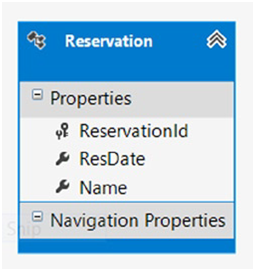问题
你想用LINQ写一个搜索查询,能被转换成更有效率的SQL.另外,你想用EF的CodeFirst方式实现.
解决方案
假设你有如下Figure 13-6所示的模型

Figure 13-6. A simple model with a Reservation entity
首先,这个例子用EF的CodeFirst方式实现,在Listing 13-10,我们创建实体类Reservation
Listing 13-10. The Reservation Entity Object
public class Reservation
{
public int ReservationId { get; set; }
public System.DateTime ResDate { get; set; }
public string Name { get; set; }
}
接下来,在Listing 13-11,我们创建用CodeFirst方式访问EF功能的DbContext对象.
Listing 13-11. DbContext Object
public class Recipe5Context : DbContext
{
public Recipe5Context()
: base("Recipe4ConnectionString")
{
// disable Entity Framework Model Compatibility
Database.SetInitializer<Recipe5Context>(null);
}
protected override void OnModelCreating(DbModelBuilder modelBuilder)
{
modelBuilder.Entity<Reservation>().ToTable("Chapter13.Reservation");
}
public DbSet<Reservation> Reservations { get; set; }
}
接下来在项目中添加App.config,并把Listing 13-12的代码添加到ConnectionStrings节下.
Listing 13-12. Connection String
<connectionStrings>
<add name="Recipe4ConnectionString"
connectionString="Data Source=.;
Initial Catalog=EFRecipes;
Integrated Security=True;
MultipleActiveResultSets=True"
providerName="System.Data.SqlClient" />
</connectionStrings>
你想用LINMQ写一个搜索查询,通过指定特定的人,或特定日期,或两者一起来获取Reservations(预定),你可能会用let关键字,像我们在Listing 13-13中的第一个查询那样,使得LINQ查询表达式更清晰可读,然而,let关键字会被转换成更复杂效率更低的SQL语句.为替换它,我们明确地在where子句里创建两个条件,像我们在Listing 13-13的第二个查询那样.
Listing 13-13. Using Both the let Keyword and Explicit Conditions in the Query
using (var context = new Recipe4Context())
{
context.Reservations.Add(new Reservation { Name = "James Jordan", ResDate = DateTime.Parse("4/18/10") });
context.Reservations.Add(new Reservation
{
Name = "Katie Marlowe",
ResDate = DateTime.Parse("3/22/10")
});
context.Reservations.Add(new Reservation
{
Name = "Roger Smith",
ResDate = DateTime.Parse("4/18/10")
});
context.Reservations.Add(new Reservation
{
Name = "James Jordan",
ResDate = DateTime.Parse("5/12/10")
});
context.Reservations.Add(new Reservation
{
Name = "James Jordan",
ResDate = DateTime.Parse("6/22/10")
});
context.SaveChanges();
}
using (var context = new Recipe4Context())
{
DateTime? searchDate = null;
var searchName = "James Jordan";
Console.WriteLine("More complex SQL...");
var query2 = from reservation in context.Reservations
let dateMatches = searchDate == null || reservation.ResDate == searchDate
let nameMatches = searchName == string.Empty || reservation.Name.Contains(searchName)
where dateMatches && nameMatches
select reservation;
foreach (var reservation in query2)
{
Console.WriteLine("Found reservation for {0} on {1}", reservation.Name,
reservation.ResDate.ToShortDateString());
}
Console.WriteLine("Cleaner SQL...");
var query1 = from reservation in context.Reservations
where (searchDate == null || reservation.ResDate == searchDate)
&&
(searchName == string.Empty || reservation.Name.Contains(searchName))
select reservation;
foreach (var reservation in query1)
{
Console.WriteLine("Found reservation for {0} on {1}", reservation.Name,
reservation.ResDate.ToShortDateString());
}
}
输出结果如下:
More complex SQL...
Found reservation for James Jordan on 4/18/2010
Found reservation for James Jordan on 5/12/2010
Found reservation for James Jordan on 6/22/2010
Cleaner SQL...
Found reservation for James Jordan on 4/18/2010
Found reservation for James Jordan on 5/12/2010
Found reservation for James Jordan on 6/22/2010
它是如何工作的
在内部写条件,如在Listing 13-13的第二个查询那样,可读性和可维护性不是很好.更具代表性地,可能用let关键字使代码更清晰可读,即使在一些情况下,会导致更复杂和低效的SQL代码.
让我们看一下这两种方式生成的SQL语句.Listing 13-14显示的是第一个查询的SQL语句.注意,在where子句里包含了case语句和一些cast语句等,如果我们的查询有更多的条件,产生的SQL语句会更复杂.
Listing 13-14. SQL Generated When let Is Used in the LINQ Query
SELECT
[Extent1].[ReservationId] AS [ReservationId],
[Extent1].[ResDate] AS [ResDate],
[Extent1].[Name] AS [Name]
FROM [Chapter13].[Reservation] AS [Extent1]
WHERE (
(CASE WHEN (@p__linq__0 IS NULL OR
@p__linq__1 = CAST( [Extent1].[ResDate] AS datetime2))
THEN cast(1 as bit)
WHEN ( NOT (@p__linq__0 IS NULL OR
@p__linq__1 = CAST( [Extent1].[ResDate] AS datetime2)))
THEN cast(0 as bit) END) = 1) AND
((CASE WHEN ((@p__linq__2 = @p__linq__3) OR
([Extent1].[Name] LIKE @p__linq__4 ESCAPE N''~''))
THEN cast(1 as bit)
WHEN ( NOT ((@p__linq__2 = @p__linq__3) OR
([Extent1].[Name] LIKE @p__linq__4 ESCAPE N''~'')))
THEN cast(0 as bit) END) = 1)
Listing 13-15显示了第二个查询产生的SQL语句,我们在where内使用条件,这个查询更简单并且在运行时更高效.
Listing 13-15. Cleaner, More Efficient SQL Generated When Not Using let in a LINQ Query
SELECT
[Extent1].[ReservationId] AS [ReservationId],
[Extent1].[ResDate] AS [ResDate],
[Extent1].[Name] AS [Name]
FROM [Chapter13].[Reservation] AS [Extent1]
WHERE (@p__linq__0 IS NULL OR
@p__linq__1 = CAST( [Extent1].[ResDate] AS datetime2)) AND
((@p__linq__2 = @p__linq__3) OR
([Extent1].[Name] LIKE @p__linq__4 ESCAPE N''~''))